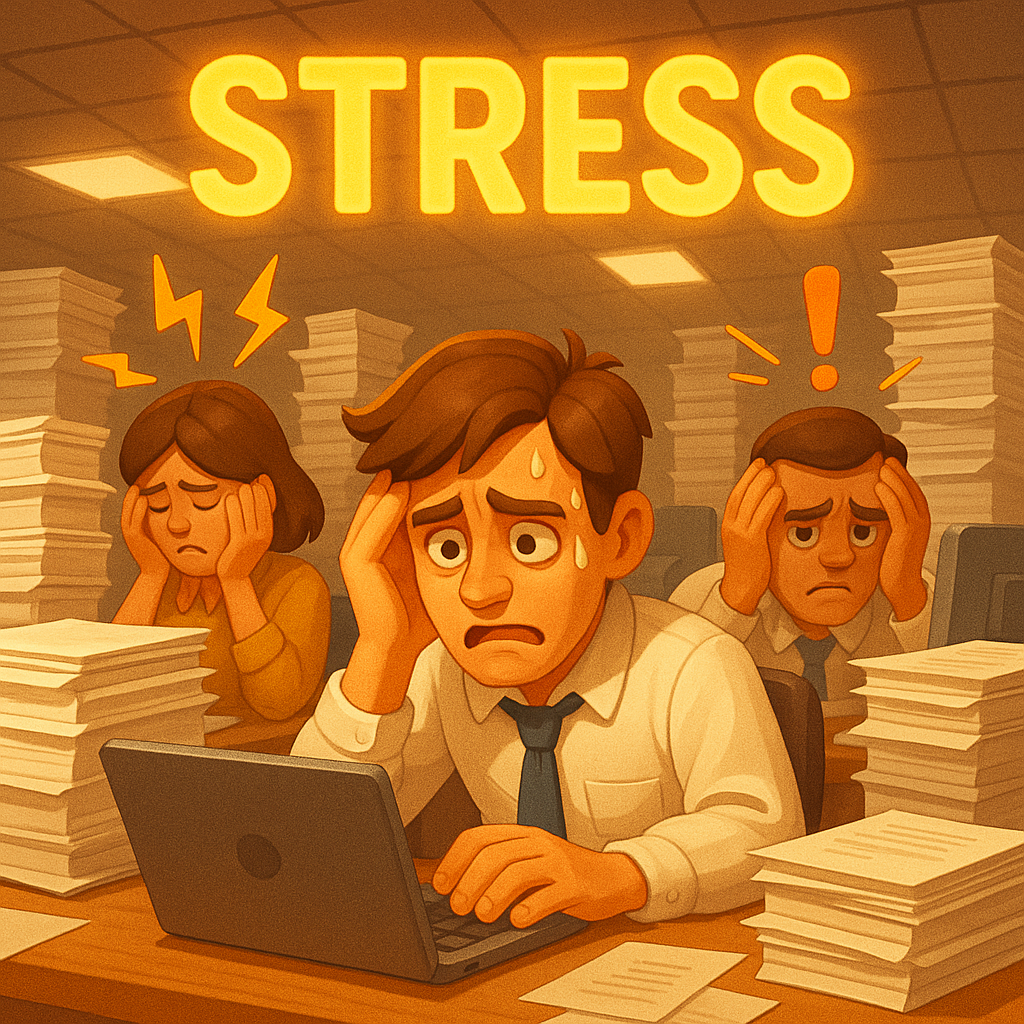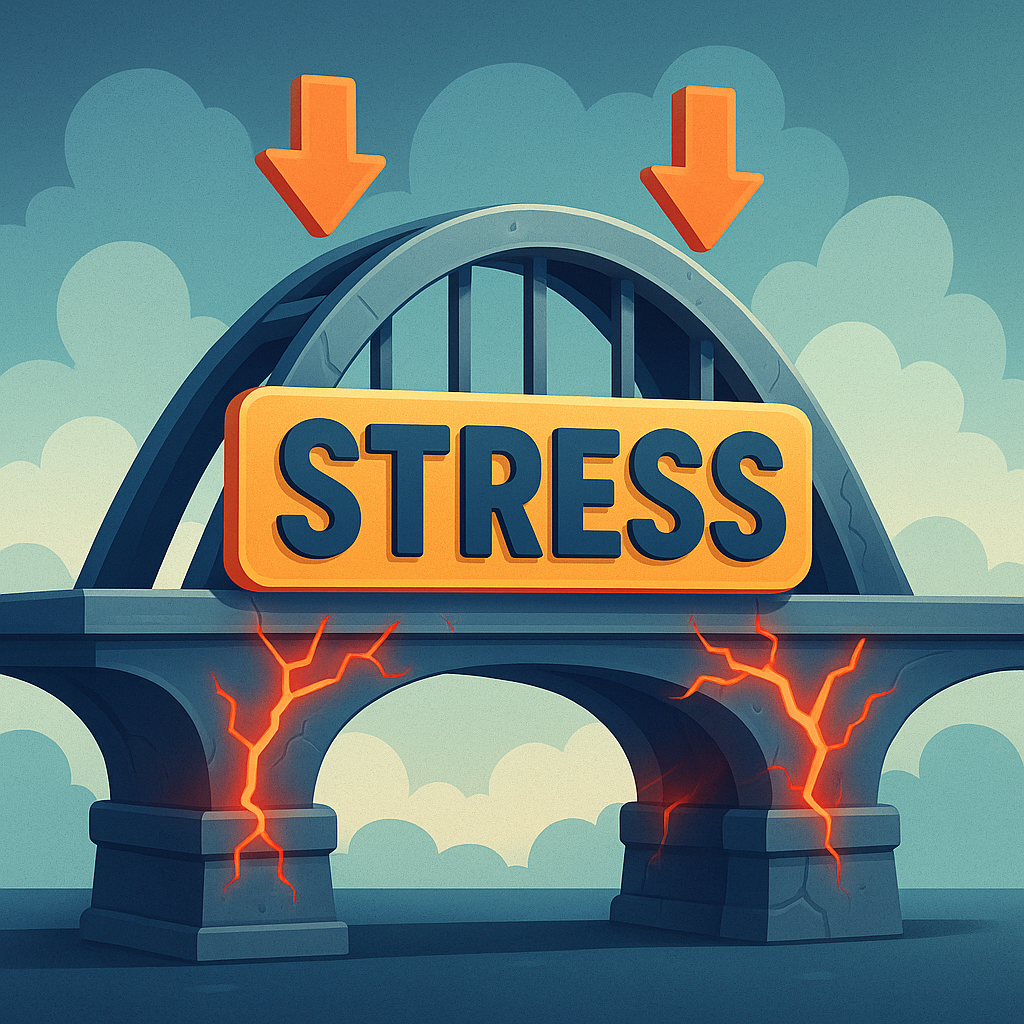Stress
Definition
The term "stress" refers to a state of mental or emotional strain, physical pressure exerted on an object, or emphasis placed on a word or phrase.
Parts of Speech
- Noun
- Verb
Pronunciation
American English
- IPA Pronunciation: /strɛs/
- Respelling: STRES
British English
- IPA Pronunciation: /strɛs/
- Respelling: STRES
Etymology
The word "stress" originates from Middle English "stresse," derived from Old French "estresse," meaning "narrowness or oppression," which in turn comes from Latin "strictus," meaning "tight or compressed." Its modern usage evolved to describe mental strain and emphasis.
Derivatives
- Stressful (adjective)
- Stressless (adjective)
- Overstress (verb)
- Distress (noun/verb)
- Restress (verb)
Synonyms
- Tension
- Pressure
- Emphasis
Antonyms
- Calm
- Relaxation
- None
Usage
The term "stress" is commonly used to describe mental strain, physical pressure, or emphasis in language. For example: "She experienced a lot of stress at work," or "Place stress on the first syllable when pronouncing this word."
Related Terms
- Tension: A state of mental or physical strain.
- Strain: A force causing tension or pressure.
- Emphasis: Special importance or prominence given to something.
Detailed Definitions
Noun
- Mental or emotional strain: Refers to psychological pressure or anxiety.
- Example: "The workload caused significant stress for the employees."
- Physical pressure or tension: Refers to force applied to an object.
- Example: "The bridge is designed to withstand high levels of stress."
- Emphasis in speech or writing: Refers to prominence placed on a syllable, word, or idea.
- Example: "The stress falls on the second syllable."
Verb
- To emphasize: Refers to placing importance or focus on something.
- Example: "He stressed the importance of punctuality."
- To subject to pressure: Refers to applying tension or force to an object or person.
- Example: "The beams were stressed during the weight test."
stress



🇨🇳 Mandarin
- 压力 (yālì) - stress (pressure)
- IPA Pronunciation: /ja̠˥˩ li˥˩/
- English Respelling: ya-lee
- 强调 (qiángdiào) - stress (emphasis)
- IPA Pronunciation: /t͡ɕʰiaŋ˧˥ tiau˥˩/
- English Respelling: chiang-deeow
🇮🇳 Hindi
- तनाव (tanāv) - stress (tension)
- IPA Pronunciation: /t̪ənaːʋ/
- English Respelling: tuh-naav
- जोर (jor) - stress (force)
- IPA Pronunciation: /d͡ʒoːr/
- English Respelling: jore
🇪🇸 Spanish
- Estrés - stress
- IPA Pronunciation: /esˈtɾes/
- English Respelling: es-tres
- Presión - pressure, can also mean stress
- IPA Pronunciation: /pɾeˈsjon/
- English Respelling: pre-syon
🇫🇷 French
- Stress - stress
- IPA Pronunciation: /stres/
- English Respelling: stress
- Tension - tension, can also mean stress
- IPA Pronunciation: /tɑ̃.sjɔ̃/
- English Respelling: taan-see-on
🇦🇪 Arabic (Modern Standard)
- ضغط (DaGT) - stress (pressure)
- IPA Pronunciation: /daɣtˤ/
- English Respelling: d-a-g-t
- التأكيد (al-ta'keed) - stress (emphasis)
- IPA Pronunciation: /al-taʔkiːd/
- English Respelling: al-ta-keed
🇧🇩 Bengali
- চাপ (chāp) - stress (pressure)
- IPA Pronunciation: /tʃap/
- English Respelling: chap
- জোর (jōr) - stress (force)
- IPA Pronunciation: /d͡ʒoːr/
- English Respelling: jore
🇷🇺 Russian
- Стресс (Stress) - stress (psychological)
- IPA Pronunciation: /strʲes/
- English Respelling: stres
- Напряжение (Napryazheniye) - stress (tension)
- IPA Pronunciation: /nəprʲɪˈʐenʲɪje/
- English Respelling: na-pryazh-eniye
🇵🇹 Portuguese
- Estresse - stress
- IPA Pronunciation: /eʃˈtɾɛsɨ/
- English Respelling: esh-tres-eh
- Pressão - pressure, can also mean stress
- IPA Pronunciation: /pɾɨˈsɐ̃w̃/
- English Respelling: pri-saown
🇮🇩 Indonesian
- Stres - stress
- IPA Pronunciation: /strɛs/
- English Respelling: strehs
- Tekanan - pressure, can also mean stress
- IPA Pronunciation: /təkaˈnan/
- English Respelling: te-ka-nan
🇩🇪 German
- Stress - stress
- IPA Pronunciation: /ʃtʁɛs/
- English Respelling: shtres
- Druck - pressure, can also mean stress
- IPA Pronunciation: /dʁʊk/
- English Respelling: druk
🇯🇵 Japanese
- ストレス (sutoresu) - stress
- IPA Pronunciation: /su͍toɾesɯ̥β/
- English Respelling: su-to-res-u
- 圧力 (atsuryoku) - pressure, can also mean stress
- IPA Pronunciation: /a̠t͡sɨᵝɾʲokɯ̟ᵝ/
- English Respelling: a-tsu-ryo-ku
🇻🇳 Vietnamese
- Sự căng thẳng - stress
- IPA Pronunciation: /sʊ kaːŋ tʰaːŋ/
- English Respelling: soo kang thang
- Áp lực - pressure, can also mean stress
- IPA Pronunciation: /a:p luk/
- English Respelling: ap luk
🇰🇷 Korean
- 스트레스 (seuteureseu) - stress
- IPA Pronunciation: /sʰtʰɯɾesʰ/
- English Respelling: shtuh-reh-suh
- 압박 (apbak) - pressure, can also mean stress
- IPA Pronunciation: /ap̚.pak̚/
- English Respelling: ahpbahk
🇹🇷 Turkish
- Stres - stress
- IPA Pronunciation: /stɾes/
- English Respelling: strehs
- Baskı - pressure, can also mean stress
- IPA Pronunciation: /bɑːskɯ/
- English Respelling: baaskuh
🇵🇰 Urdu
- تناو (Tanau) - stress
- IPA Pronunciation: /t̪ə.nɑːʊ/
- English Respelling: ta-naau
- دباو (Dabao) - pressure, can also mean stress
- IPA Pronunciation: /d̪ə.bɑː.oː/
- English Respelling: da-baao





